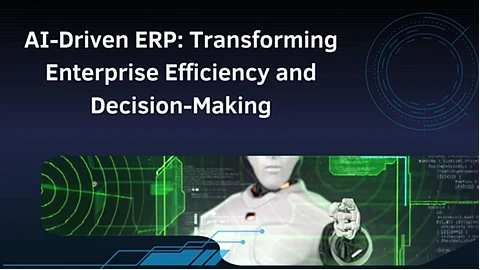

With the current digital transformation age, Enterprise Resource Planning (ERP) systems have been the cornerstone of businesses, bringing together fundamental operations such as finance, supply chain, and human resources. With AI developing further, its convergence with ERP is changing the way enterprises are managed. This article, based on Prahlad Reddy Devireddy's insights, discusses how AI advancements are transforming ERP functionalities.
Classic ERP solutions were meant essentially for reporting against historical data. AI-powered predictive analytics is transforming decision-making as it can anticipate trends and identify potential disruptors. Firms using AI-driven analytics have resulted in over 31% increased accuracy in forecasting demand, making them more adept at inventory control and saving on costs.
Financial institutions too are gaining extensively, employing predictive analytics to identify fraud more effectively, mitigate risk, and stay compliant with the regulator. AI, through the processing of large sets of data in real-time, helps organizations anticipate changes in the market, optimize functions, and increase efficiency as a whole. As predictive analytics grows in capability, companies across industries are establishing themselves at an advantage by using data-driven insights and decision-making that precedes.
Autonomous agents are revolutionizing process automation by expanding Robotic Process Automation (RPA) functionality within ERP systems. In accounting and finance, AI-based automation has reduced invoice processing cost by more than 70%, speeding up the completion of transactions from days to minutes. Machine learning increases ERP flexibility, allowing systems to dynamically adapt to changing workflows with minimal input. These smart agents scan for patterns, forecast inefficiency, and optimize functions in real time, delivering unprecendented efficiency.
Businesses benefit from reduced manual effort, improved accuracy, and faster decision-making. As AI continues to evolve, autonomous ERP systems will further revolutionize industries by seamlessly managing complex processes, ensuring compliance, and delivering significant cost savings. This marks a shift from rule-based automation to truly intelligent, adaptive systems.
Apart from conventional automation, cognitive automation incorporates AI to manage difficult, unstructured data. Organizations that use this method have cut down on decision-processing time by more than 40%. In healthcare, ERP systems aided by AI now manage medical records more accurately than human experts, minimizing administrative cost and improving management of patient care.
Natural Language Processing (NLP) is revolutionizing ERP systems with its ability to make them more user-friendly and intuitive. NLP-based interfaces allow non-technical users to communicate easily with ERP software, eliminating much of its complexity. Organizations that have implemented NLP-based solutions have seen a 74% reduction in the time it takes to create reports, optimizing workflows and efficiency. Moreover, these interfaces reduce errors and enhance user interaction, which contributes to greater productivity among enterprises.
By making data retrieval easier and automating functions using natural language instructions, NLP improves the usability of ERP, enabling all employees. This way, companies enjoy better decision-making and business agility in a more digital environment.
ERP-integrated computer vision driven by AI has transformed supply chain management by making logistics and manufacturing processes more efficient. In warehousing operations, vision systems driven by AI ensure up to 99% accuracy in inventory counts, greatly saving on labor and automating processes. The vision systems provide real-time synchronization of physical assets and ERP platforms, with accurate inventory tracking, demand planning, and automatic stock replenishment.
By reducing errors and optimizing resource usage, computer vision improves operational responsiveness, decreases downtime, and streamlines order fulfillment. This revolutionary technology is redefining supply chains of today, achieving cost savings, and enhancing overall logistics and manufacturing efficiency.
AI-based ERP is moving towards self-healing and autonomous decision-making, changing enterprise operations. Self-healing ERP systems automatically identify and correct problems, reducing downtime by as much as 89%. The intelligent systems increase reliability and efficiency without human intervention. Moreover, AI-based autonomous decision execution is changing primary ERP functions such as inventory management and production scheduling.
Through the use of predictive analytics and real-time information, these systems streamline processes, optimize resource usage, and cut operational expenses. Companies embracing autonomous ERP become more agile, which means smooth operations even under changing conditions. With evolving AI capabilities, self-improving ERP solutions will continue to disrupt business intelligence on a large scale, enabling more intelligent, data-based decision-making at scale.
The AI-based ERP global market is also estimated to grow at a compound annual rate of almost 30% and exceed $49 billion by 2032. Companies that adopt AI-powered ERP systems experience productivity gains of more than 27% in their main business processes. The application of AI in ERP goes beyond cost savings, playing a significant role in improved decision-making, improved customer experience, and faster business innovation.
In summary, the adoption of AI into ERP systems is a core revolution and not just an improvement. Through the power of AI-powered automation, predictive analytics, and smart decision-making, companies are realizing unprecedented levels of productivity. As Prahlad Reddy Devireddy stresses, the future of ERP is unequivocally intelligent, adaptive, and continuously evolving to accommodate the changing needs of contemporary businesses.
